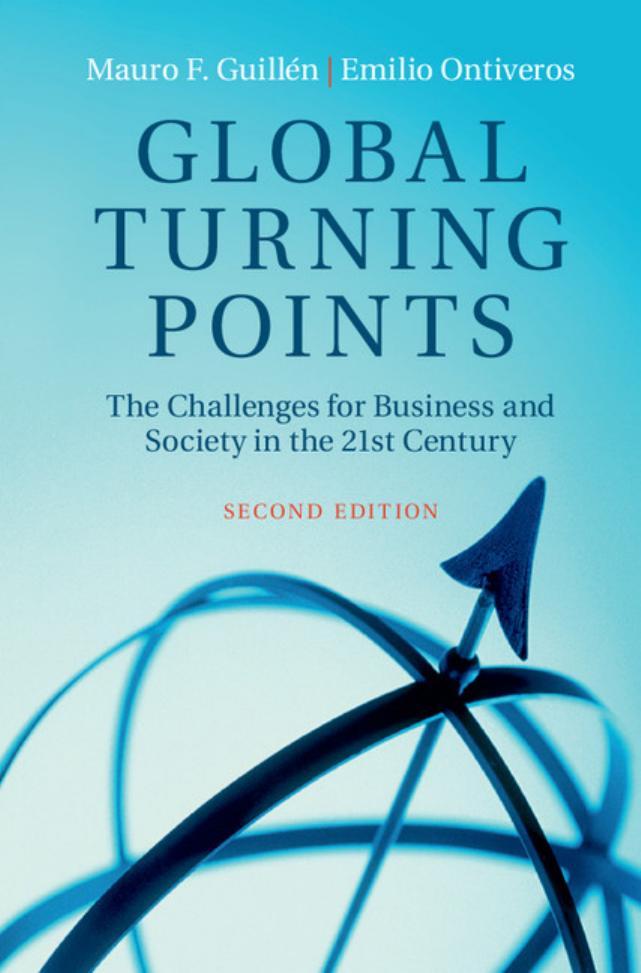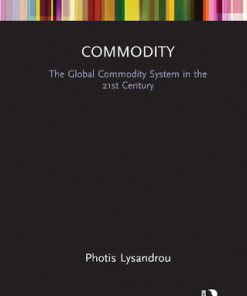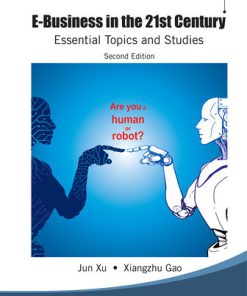Global Turning Points The Challenges for Business and Society in the 21st Century 2nd Edition by Mauro Guillen ISBN 1316557677 9781316557677
$50.00 Original price was: $50.00.$25.00Current price is: $25.00.
Global Turning Points The Challenges for Business and Society in the 21st Century 2nd Edition by Mauro F. Guillen – Ebook PDF Instant Download/Delivery: 1316557677, 978-1316557679
Full dowload Global Turning Points The Challenges for Business and Society in the 21st Century 2nd Edition after payment

Product details:
ISBN 10: 1316557677
ISBN 13: 978-1316557679
Author: Mauro F. Guillen
Global Turning Points The Challenges for Business and Society in the 21st Century 2nd Table of contents:
1. Welcome to the Twenty-First Century
- Introduces the key themes of the book, exploring how the world has evolved in the 21st century, particularly the global shifts in economics, politics, and demographics.
2. A Global Economy Out of Balance
- Global encounters of the third kind: Examines how globalization has led to unexpected or disruptive interactions across borders.
- The most complex crisis in history: Discusses the 2008 financial crisis and its ongoing global impact.
- Financial services after the crisis: Focuses on changes in the financial services industry.
- Changes in the distribution of global economic power: Highlights the shifting economic power, particularly to emerging markets.
3. The Rise of Emerging-Market Multinationals
- Taking over major industries: Looks at how companies from emerging markets have begun dominating industries that were once the preserve of Western multinationals.
- Sovereign wealth funds: Discusses the increasing importance of sovereign wealth funds and their impact on global markets.
- Are emerging-market multinationals different?: Examines whether companies from emerging markets behave differently from their Western counterparts.
- Sovereignty, political influence, and geopolitics: Explores the intersection of business and politics in emerging markets.
- How emerging-market multinationals are changing the world: Analyzes how these companies are reshaping global business practices and geopolitics.
4. The New Demography: Aging, Migration, and Obesity
- Demography in the new century: Analyzes global demographic trends, focusing on aging populations, migration, and rising obesity rates.
- The economic implications of population aging: Discusses the challenges and opportunities created by aging societies.
- The social, cultural, political, and geopolitical consequences: Looks at how demographic shifts affect societies on multiple levels.
5. From Dictatorship to Democracy and Failed States
- Four waves of transition from dictatorship to democracy: Examines the patterns of democratization around the world.
- Mobile phones, the Internet, and political mobilization: Focuses on how technology, particularly mobile phones and the internet, have influenced political movements.
- “Good governance” and the irony of diminished state legitimacy and capacity: Discusses the paradox of calls for good governance amidst weak state structures.
- Failed states: Explores the growing phenomenon of failed states and the challenges they pose to global stability.
- New forms of violent conflict: Analyzes emerging forms of conflict, such as asymmetric warfare and civil wars.
6. A Disparate World: Inequality and Poverty
- The paradox of growing inequality and declining poverty: Looks at the contradiction of rising inequality even as global poverty decreases.
- Gender inequality: Examines how gender disparities persist globally, even amid progress.
- The consequences of shifting patterns of global inequality: Analyzes how global inequality has shifted and its societal consequences.
7. The Rise of the Global Middle Class and the High-Net-Worth Elite
- Defining and measuring the global middle class: Examines how the global middle class is growing, especially in emerging markets.
- What characterizes the middle-class consumer?: Discusses the consumer behavior of the global middle class.
- The millionaires: Analyzes the rise of the wealthy elite, focusing on high-net-worth individuals.
- Gender and wealth: Examines the intersection of wealth and gender disparities.
8. The Transformative Power of Technology
- Information and communications technology: Discusses the role of ICT in transforming economies and societies.
- The digital economy: Looks at the rise of the digital economy and its global implications.
- The rise of the collaborative economy: Focuses on the growth of collaborative platforms like Uber and Airbnb.
- The digital economy and employment: Analyzes how digital platforms are changing labor markets.
- Information technology and the government: Discusses the role of IT in transforming government functions.
- Promoting technology and innovation: Looks at strategies for fostering technological innovation globally.
9. Development, Institutions, and Entrepreneurship
- Enter entrepreneurship: Explores the rise of entrepreneurship as a key driver of economic development.
- Measuring and tracking institutions: Discusses the role of institutions in fostering development and entrepreneurship.
- Gender, development, and entrepreneurship: Examines the barriers and opportunities for women in entrepreneurship.
- Obstacles to entrepreneurship by women: Focuses on the specific challenges faced by women entrepreneurs in the global economy.
10. The Quest for Sustainability
- The rise of environmental awareness: Discusses the growing importance of environmental sustainability in business and society.
- Food and water: Explores global challenges related to food security and water resources.
- Energy: Focuses on the energy transition and the role of renewables.
- Emerging economies and sustainability: Examines how emerging economies are addressing sustainability issues.
- Sustainability, competitiveness, and business opportunities: Looks at how sustainability can create new business opportunities.
11. The Trials and Tribulations of the Financial System
- The crisis and its impact: Reviews the long-term effects of the global financial crisis.
- Traumas and disappointments: Discusses the challenges and disappointments of the post-crisis financial system.
- Banks will not be what they used to be: Analyzes the transformation of the banking sector.
- Regulation: Focuses on the role of financial regulation in stabilizing markets.
- Technology: Looks at how technology is disrupting financial services.
- Disintermediation: Explores how traditional intermediaries in the financial system are being bypassed.
- Shifting demographics: Discusses how demographic trends are impacting the financial system.
- The new normal is financial instability: Concludes that financial instability may be the new norm in the global system.
12. The Global Powers of the Twenty-First Century
- Patterns of rise and decline: Discusses the rise and fall of global powers, particularly focusing on China and the U.S.
- From Pax Americana to Pax Sinica?: Analyzes the potential shift from American dominance to Chinese leadership in global affairs.
- Chinese views on China’s global ascendancy: Explores how China perceives its growing global power.
- Is global influence a zero-sum game?: Looks at whether global influence is limited and whether countries can rise without causing others to fall.
13. Coping with Uncertainty and Complexity
- The four institutional gearboxes shaping global dynamics: Discusses key institutional forces shaping global change.
- The pervasiveness of financial markets: Explores the influence of financial markets on global events.
- What is to be done?: Concludes with strategies for coping with uncertainty and complexity in the global system.
People also search for Global Turning Points The Challenges for Business and Society in the 21st Century 2nd :
historical turning points in the development of global health
global and local turning points
turning point global solutions
what are some turning points in history
how many turning points
You may also like…
Business & Economics - Management & Leadership
Politics & Philosophy - Government & Politics
Politics & Philosophy - Anthropology
Business & Economics
Commodity The Global Commodity System in the 21st Century 1st Edition Photis Lysandrou
History - Ancient History
Uncategorized
E-Business in the 21st Century: Essential Topics And Studies 2nd Edition Jun Xu And Xiangzhu Gao
Business & Economics - Responsibility and Business Ethics
History - World History
Relationships & Lifestyle - Diet & Nutrition
Community Mental Health: Challenges for the 21st Century Jessica Rosenberg












